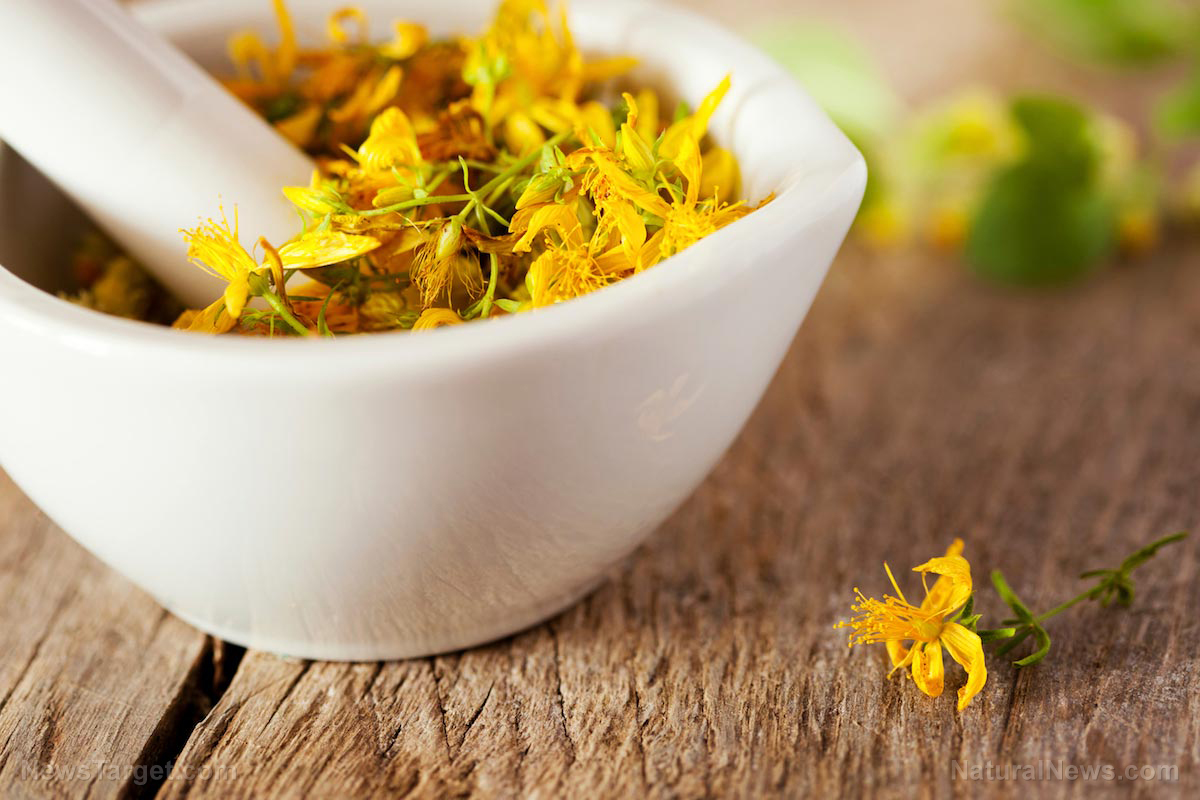Everything you need to know about using St. John’s wort for depression
10/18/2018 / By Edsel Cook

Is St. John’s wort (Hypericum perforatum) a safe and effective natural treatment for depression? You may be asking yourself that question given the controversy that hounds this popular herb. An article in Be Brain Fit takes an in-depth look at the details regarding this medicinal plant.
The plant is named after St. John the Baptist. It has seen use as a natural remedy for thousands of years. Traditional healers prescribed it for diverse conditions, including melancholy.
Modern science has identified many therapeutic uses for St. John’s wort. It is most commonly used to alleviate depression.
The official opinion of the herb varies by country. It is a prescription supplement in Germany, a herbal supplement in the United States, and banned in other countries.
The scientific literature is similarly mixed. A 2008 Cochrane review found that St. John’s wort could match the effectiveness of prescription antidepressants while demonstrating fewer drawbacks.
An NIMH study, on the other hand, reported that it did not outperform a placebo for treating minor and major depression. However, the antidepressant drug used for those tests proved just as ineffective.
St. John’s wort contains numerous bioactive compounds. Hypericin and hyperforin are the most important of these natural chemicals.
Hyperforin increases the levels of brain chemicals connected with moods. It also improves the effectiveness of serotonin, the neurotransmitter that is closely linked to depression.
The herb also contains a lot of flavonoids, which are strong antioxidants and anti-inflammatories. By shielding the brain from harmful inflammation, flavonoids can possibly prevent depression. (Related: St. John’s wort: A scientific review of its remarkable antibacterial and antioxidant properties.)
St. John’s wort is not for everyone
Unlike many herbal remedies, St. John’s wort has a large number of side effects. It can cause anxiety, nausea, and high blood pressure.
A unique risk is photosensitivity. The hypericin in the herb reacts very strongly to sunlight. If you take this herbal supplement, make sure to protect your sensitive skin and eyes from bright light.
Furthermore, St. John’s wort does not interact well with hundreds of prescription medicines. So do not take it alongside pharmaceutical antidepressants. Also, avoid it if you are pregnant, breastfeeding, or suffer from bipolar disorder or schizophrenia.
If you are taking the herbal supplement, refrain from eating foods that are rich in tyramine. These foods are often aged, fermented, pickled, or smoked. They can cause bad reactions in people with high blood pressure. Pass on alcohol and caffeine, as well.
When it comes to other herbal supplements, St. John’s wort shows good synergy with the other herbs. But it does not go well with 5-HTP, another supplement that is often taken for anxiety, depression, and insomnia.
Do not take these supplements together. If you are taking a mood-improving formula with different ingredients, make sure it has only one of these.
Alternatives to this supplement include curcumin and saffron. You can also practice breathing exercises or mindful meditation.
Take the right dose of St. John’s wort to boost your mood
Get your supplements from a trustworthy brand. Try to find a source in Germany, where St. John’s wort is prescribed as a medicine and is subject to stricter regulations.
Look for one that has a good amount of hyperforin. This is the ingredient that accounts for most of the mood-boosting effects of the herbal supplement.
If you are taking the standard extract, most prescriptions set the dosage as 300 milligrams of extract taken thrice a day. If you are consuming the dried herb, two to four grams will suffice.
Last but not least, give it time to work. It can take several weeks before you feel a difference.
Herbs.news has more stories about the mood-improving benefits of St. John’s wort.
Sources include:
Tagged Under: alternative medicine, Antidepressants, herbal medicines, herbal supplements, medicinal herbs, mood boosters, natural antidepressants, St. John's wort
RECENT NEWS & ARTICLES
COPYRIGHT © 2017 BEATDEPRESSION.NEWS
All content posted on this site is protected under Free Speech. BeatDepression.news is not responsible for content written by contributing authors. The information on this site is provided for educational and entertainment purposes only. It is not intended as a substitute for professional advice of any kind. BeatDepression.news assumes no responsibility for the use or misuse of this material. All trademarks, registered trademarks and service marks mentioned on this site are the property of their respective owners.



















